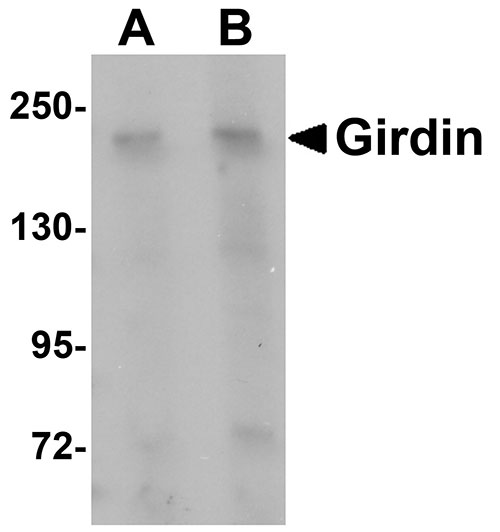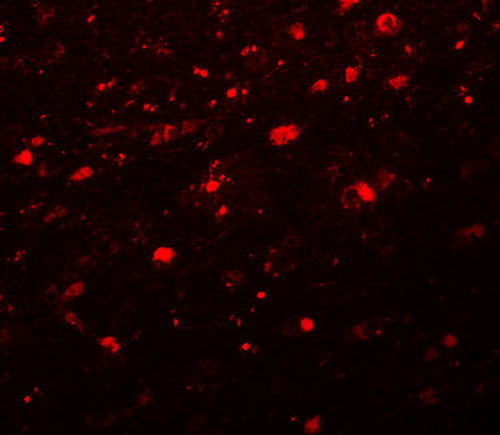Girdin Antibody
- SPECIFICATION
- CITATIONS
- PROTOCOLS
- BACKGROUND

Application
| WB, IF, E |
|---|---|
| Primary Accession | Q3V6T2 |
| Other Accession | NP_060554, 50897852 |
| Reactivity | Human, Mouse, Rat |
| Host | Rabbit |
| Clonality | Polyclonal |
| Isotype | IgG |
| Calculated MW | 216042 Da |
| Application Notes | Girdin antibody can be used for detection of Girdin by Western blot at 1 - 2 µg/mL. For immunofluorescence start at 20 µg/mL. |
| Gene ID | 55704 |
|---|---|
| Target/Specificity | CCDC88A; |
| Reconstitution & Storage | Girdin antibody can be stored at 4℃ for three months and -20℃, stable for up to one year. As with all antibodies care should be taken to avoid repeated freeze thaw cycles. Antibodies should not be exposed to prolonged high temperatures. |
| Precautions | Girdin Antibody is for research use only and not for use in diagnostic or therapeutic procedures. |
| Name | CCDC88A |
|---|---|
| Function | Bifunctional modulator of guanine nucleotide-binding proteins (G proteins) (PubMed:19211784, PubMed:27621449). Acts as a non-receptor guanine nucleotide exchange factor which binds to and activates guanine nucleotide-binding protein G(i) alpha subunits (PubMed:19211784, PubMed:21954290, PubMed:23509302, PubMed:25187647). Also acts as a guanine nucleotide dissociation inhibitor for guanine nucleotide- binding protein G(s) subunit alpha GNAS (PubMed:27621449). Essential for cell migration (PubMed:20462955, PubMed:16139227, PubMed:19211784, PubMed:21954290). Interacts in complex with G(i) alpha subunits with the EGFR receptor, retaining EGFR at the cell membrane following ligand stimulation and promoting EGFR signaling which triggers cell migration (PubMed:20462955). Binding to Gi-alpha subunits displaces the beta and gamma subunits from the heterotrimeric G-protein complex which enhances phosphoinositide 3-kinase (PI3K)-dependent phosphorylation and kinase activity of AKT1/PKB (PubMed:19211784). Phosphorylation of AKT1/PKB induces the phosphorylation of downstream effectors GSK3 and FOXO1/FKHR, and regulates DNA replication and cell proliferation (By similarity). Binds in its tyrosine-phosphorylated form to the phosphatidylinositol 3-kinase (PI3K) regulatory subunit PIK3R1 which enables recruitment of PIK3R1 to the EGFR receptor, enhancing PI3K activity and cell migration (PubMed:21954290). Plays a role as a key modulator of the AKT-mTOR signaling pathway, controlling the tempo of the process of newborn neuron integration during adult neurogenesis, including correct neuron positioning, dendritic development and synapse formation (By similarity). Inhibition of G(s) subunit alpha GNAS leads to reduced cellular levels of cAMP and suppression of cell proliferation (PubMed:27621449). Essential for the integrity of the actin cytoskeleton (PubMed:16139227, PubMed:19211784). Required for formation of actin stress fibers and lamellipodia (PubMed:15882442). May be involved in membrane sorting in the early endosome (PubMed:15882442). Plays a role in ciliogenesis and cilium morphology and positioning and this may partly be through regulation of the localization of scaffolding protein CROCC/Rootletin (PubMed:27623382). |
| Cellular Location | Cell membrane; Peripheral membrane protein. Cytoplasm, cytosol. Cytoplasmic vesicle. Cell projection, lamellipodium. Cytoplasm, cytoskeleton, cilium basal body. Cytoplasm, cytoskeleton, microtubule organizing center, centrosome, centriole. Note=Localizes to the cytosol in unstimulated cells while EGF stimulation promotes membrane localization and guanine nucleotide exchange factor activity (PubMed:27864364) Localizes to the cell membrane through interaction with phosphoinositides (PubMed:16139227, PubMed:15882442) |
| Tissue Location | Expressed ubiquitously. |

Thousands of laboratories across the world have published research that depended on the performance of antibodies from Abcepta to advance their research. Check out links to articles that cite our products in major peer-reviewed journals, organized by research category.
info@abcepta.com, and receive a free "I Love Antibodies" mug.
Provided below are standard protocols that you may find useful for product applications.
Background
Girdin Antibody: Girdin is a Galpha-interacting protein that can enhance the activation of the protein kinase Akt, remodel the actin cytoskeleton, and is thought to be involved in the regulation of cell migration and cancer metastasis. It has recently been shown that Girdin interacts with Disrupted-in-Schizophrenia 1 (DISC1), a susceptibility gene for major psychiatric disorders. DISC1 is thought to be involved in the migration, positioning and differentiation of dentate granule cells (DGCs) during development; depletion of Girdin or blocking the Girdin-DISC1 interaction results in defects in axonal sprouting in the CA3 region of the hippocampus and overextended migration of mispositioning of DGCs, suggesting the Girdin plays a role in postnatal neurogenesis in the dentate gyrus.
References
Le-Niculescu H, Niesman I, Fischer T, et al. Identification and characterization of GIV, a novel Galpha i/s-interacting protein found on COPI, endoplasmic reticulum-Golgi transport vesicles. J. Biol. Chem.2005; 280:22012-20.
Anai M, Shojima N, Katagiri H, et al. A novel protein kinase B (PKB)/Akt-binding protein enhances PKB kinase activity and regulates DNA synthesis. J. Biol. Chem.2005; 280:18525-35.
Enomoto A, Murakami H, Asai N, et al. Akt/PKB regulated actin organization and cell motility via Girdin/APE. Dev. Cell2005; 9:389-402.
Enomoto A, Asai N, Namba T, et al. Roles of disrupted-in-schizophrenia 1-interacting protein girdin in postnatal development of the dentate gyrus. Neuron2009; 63:774-87.
If you have used an Abcepta product and would like to share how it has performed, please click on the "Submit Review" button and provide the requested information. Our staff will examine and post your review and contact you if needed.
If you have any additional inquiries please email technical services at tech@abcepta.com.













 Foundational characteristics of cancer include proliferation, angiogenesis, migration, evasion of apoptosis, and cellular immortality. Find key markers for these cellular processes and antibodies to detect them.
Foundational characteristics of cancer include proliferation, angiogenesis, migration, evasion of apoptosis, and cellular immortality. Find key markers for these cellular processes and antibodies to detect them. The SUMOplot™ Analysis Program predicts and scores sumoylation sites in your protein. SUMOylation is a post-translational modification involved in various cellular processes, such as nuclear-cytosolic transport, transcriptional regulation, apoptosis, protein stability, response to stress, and progression through the cell cycle.
The SUMOplot™ Analysis Program predicts and scores sumoylation sites in your protein. SUMOylation is a post-translational modification involved in various cellular processes, such as nuclear-cytosolic transport, transcriptional regulation, apoptosis, protein stability, response to stress, and progression through the cell cycle. The Autophagy Receptor Motif Plotter predicts and scores autophagy receptor binding sites in your protein. Identifying proteins connected to this pathway is critical to understanding the role of autophagy in physiological as well as pathological processes such as development, differentiation, neurodegenerative diseases, stress, infection, and cancer.
The Autophagy Receptor Motif Plotter predicts and scores autophagy receptor binding sites in your protein. Identifying proteins connected to this pathway is critical to understanding the role of autophagy in physiological as well as pathological processes such as development, differentiation, neurodegenerative diseases, stress, infection, and cancer.



